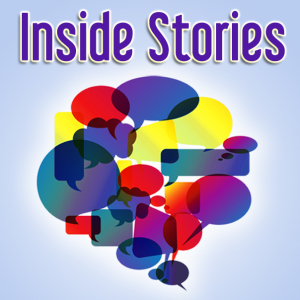 Annie Robinson (52 Posts)
Annie Robinson (52 Posts)Curator of Inside Stories and in-Training Staff Member
Columbia University
Annie Robinson completed a Master of Science in Narrative Medicine at Columbia University in 2014. She previously studied the healing power of stories as an undergraduate at NYU’s Gallatin School of Individualized Study.
Annie works as Narrative Coaching Specialist with Eating Disorder Recovery Specialists, helping individuals in the early stages of eating disorder recovery through mindfulness, meditation, yoga, and narrative practices. She is also the Program Officer at Health Story Collaborative, a non-profit that creates forums for individuals to tell their stories of personal health challenges, and curates another oral narratives projects called On the Road to Recovered: Voices from the Eating Disorder Recovery Community.
Annie is a coordinator and full-spectrum doula for The Doula Project in New York City, providing compassionate care for women during experiences of abortion, miscarriage, and fetal loss.
As a yoga teacher, writer, educator, and co-founder of NYC-based wellness community Pause, Breathe, and Connect, Annie shares her passion for integrative approaches to wellbeing. She is dedicated to creating spaces for people to explore the healing potential of interweaving of stories, spirituality, and somatic experience.
Inside Stories
Inside Stories is an oral narratives project which invites medical students to share their experiences in medical school in the form of brief podcasts published and archived on in-Training. The project aims to provide a means of personal healing, self-realization and empowerment through the sharing and receiving of personal stories, as well as to cultivate community among students in the often isolating medical school environment. The title Inside Stories reflects the project's mission to encourage students to go inside themselves and bring forth things that often go unspoken. It also represents the inside look listeners are granted into the sometimes private, challenging and confusing experiences students may have.
Made possible in part by a grant from the Arnold P. Gold Foundation and FJC.


How can doctors-in-training take advantage of the distinct liberty they have to bond the patient Stephan, a fourth-year medical student in Cincinnati when interviewed and now an ophthalmology resident, reflects on how the art of connecting deeply with patients is not prioritized — but this can be remedied. He tells a story about a patient he met on his internal medicine rotation that illustrates how medical students are in a unique position to cultivate relationships in health care.
How can doctors-in-training support patients and colleagues who are transgender? Olivia, a third-year medical student in Chicago pursuing a career in facial reconstructive surgery, transitioned from male to female while she was applying to medical school. As one of the few openly trans medical students in the country, she speaks about the stereotypes and logistical challenges trans people confront in medicine. Olivia aspires to use her own experiences as a trans person in the medical system – as both consumer and provider – to positively impact others in similar positions.
How can doctors-in-training learn to have hard discussions with their patients? Will, a fourth-year medical student intending to become an internist, recounts two formative patient encounters he had during his third year. In the first, he learned from an attending physician and a man dying from cancer the challenges of determining when it’s time to end treatment. In the second, he realized a non-English speaking patient did not understand that she had lupus, and thus took the initiative to more effectively translate to her what the condition meant.
How can doctors-in-training incorporate wisdom from spiritual traditions into the delivery of health care? Rembrandt, a second-year medical student in Chicago, shares his exploration of how lessons from Christianity offer him insight into life’s big questions that arise in medicine.
How can doctors-in-training practice not just patient-centered, but family-centered medicine? Carissa, a graduating fourth-year medical student in Indianapolis intending to pursue an obstetrics and gynecology residency, shares the lessons she learned as a medical student when her mother was diagnosed with breast cancer.
How can doctors-in-training effectively voice doubt and dissent in the medical school environment? Joji, a fourth-year medical student who plans to go into family medicine, describes the conflicts he has had with his school’s administration, and what it feels like to live in fear of dismissal.
How can doctors-in-training honor the experiences of patients’ family members? Tarik, a fourth-year medical student, shares the lessons she learned from an Egyptian man who served as the primary caregiver for his wife, who had advanced multiple sclerosis.
How can doctors-in-training build relationships with patients despite language barriers? Chelsea, a fourth-year medical student who will soon begin family medicine residency training in Boston, recalls the lessons she learned about the power of nonverbal communication from a patient she met while working in Rwanda.
How can doctors-in-training overcome feelings of inadequacy? Robert, a fourth-year medical student in Philadelphia hoping to become a pediatric dermatologist, discusses the benefits of exposing his vulnerabilities.
How can doctors-in-training foster intimate connections to keep their passion for medicine alive? Sara, a rising medical intern in physical medicine and rehabilitation, reflects on the community activities she engaged in during medical school that allowed joy and presence to be a central part of her educational experience.
How can doctors-in-training create balance in their lives and not let school define them? Jazmin, a fourth-year medical student in Galveston, Texas who intends to begin pediatric residency next year, discusses how important it was for her to not solely identify as a student during the four years of medical school. She also espouses the benefits of creating a family-like community at school.
How can doctors-in-training integrate policy change with patient care? Matt, a fourth-year medical student in Philadelphia deciding whether to pursue clinical medicine at all, shares his divergent path through medical school that involved taking two years off. He reflects how his work with the government on systemic health care issues and later in medical communications informed and reinvigorated his work on the wards.
 Annie Robinson (52 Posts)
Annie Robinson (52 Posts)Curator of Inside Stories and in-Training Staff Member
Columbia University
Annie Robinson completed a Master of Science in Narrative Medicine at Columbia University in 2014. She previously studied the healing power of stories as an undergraduate at NYU’s Gallatin School of Individualized Study.
Annie works as Narrative Coaching Specialist with Eating Disorder Recovery Specialists, helping individuals in the early stages of eating disorder recovery through mindfulness, meditation, yoga, and narrative practices. She is also the Program Officer at Health Story Collaborative, a non-profit that creates forums for individuals to tell their stories of personal health challenges, and curates another oral narratives projects called On the Road to Recovered: Voices from the Eating Disorder Recovery Community.
Annie is a coordinator and full-spectrum doula for The Doula Project in New York City, providing compassionate care for women during experiences of abortion, miscarriage, and fetal loss.
As a yoga teacher, writer, educator, and co-founder of NYC-based wellness community Pause, Breathe, and Connect, Annie shares her passion for integrative approaches to wellbeing. She is dedicated to creating spaces for people to explore the healing potential of interweaving of stories, spirituality, and somatic experience.
Inside Stories
Inside Stories is an oral narratives project which invites medical students to share their experiences in medical school in the form of brief podcasts published and archived on in-Training. The project aims to provide a means of personal healing, self-realization and empowerment through the sharing and receiving of personal stories, as well as to cultivate community among students in the often isolating medical school environment. The title Inside Stories reflects the project's mission to encourage students to go inside themselves and bring forth things that often go unspoken. It also represents the inside look listeners are granted into the sometimes private, challenging and confusing experiences students may have.
Made possible in part by a grant from the Arnold P. Gold Foundation and FJC.






